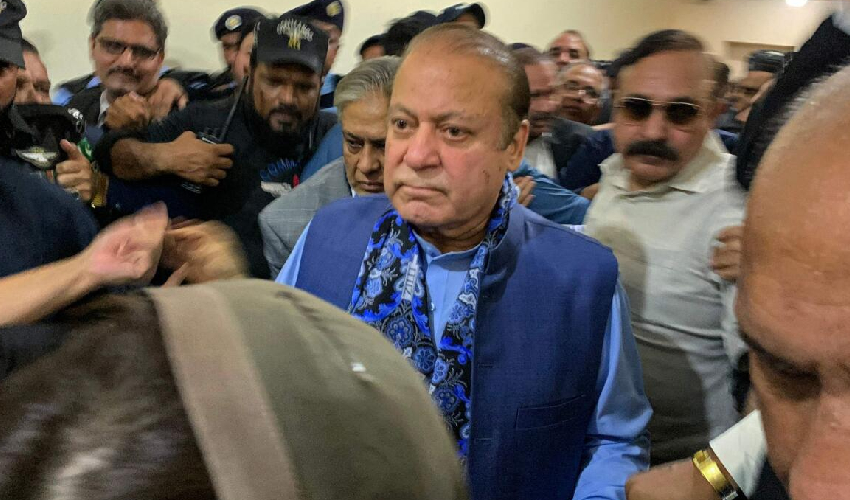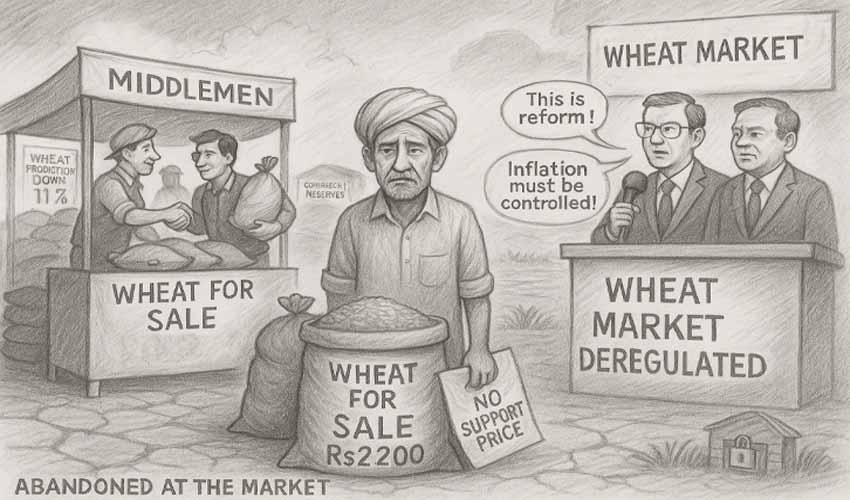The Islamabad High Court (IHC) on Monday adjourned the appeals of former prime minister and Pakistan Muslim League - Nawaz (PML-N) chief Nawaz Sharif against his convictions in the Avenfield Apartments and Al-Azizia Steel Mills corruption cases till Wednesday.
In 2018, Sharif was sentenced to 10 years in jail in the Avenfield properties reference for owning assets beyond known income and one year for not cooperating with the National Accountability Bureau (NAB). He was also sentenced to seven years in jail in the Al-Azizia case.
The IHC declared Sharif a proclaimed offender in both cases in December 2020 after he left for London on medical grounds. He returned to Pakistan last month.
In July 2021, Sharif filed applications seeking the restoration of his appeals against his conviction in both cases. The IHC restored the appeals in November 2021.
Hearing
The hearing took place at the IHC by a two-member bench headed by Chief Justice Aamer Farooq and Justice Miangul Hassan Aurangzeb.
At the commencement of the hearing, Nawaz's lawyer, Amjad Pervaiz, presented his arguments before the court.
Responding to the court's inquiry about the origin of the presented facts, Pervaiz clarified that three facts predated the reference filing, while the rest were subsequent.
Drawing upon the Supreme Court's (SC) ruling in the Panama Papers case, which led to Nawaz's disqualification, Pervaiz reminded the court of the establishment of a joint investigation team (JIT) in response to the verdict.
Justice Aurangzeb questioned the relevance of Pervaiz's arguments. In response, the counsel provided the court with details about the JIT's formation and members.
He informed the IHC that the JIT submitted a comprehensive 12-volume report to the apex court in July 2017.
Following the presentations of the involved parties, the court issued its final verdict on July 28, 2017, disqualifying Nawaz.
Justice Aurangzeb sought clarity from Pervaiz regarding the specific orders issued by the SC. He inquired whether the SC had provided directives to the NAB chairman.
Pervaiz affirmed that the apex court had issued explicit instructions to NAB to file references against Nawaz Sharif.
He specified that the SC had ordered references against Nawaz, his daughter Maryam, sons Husain and Hasan, and Captain (rtd) Safdar in the Avenfield case, while the Al-Azizia and Flagship references were to be filed against Nawaz and his two sons.
The lawyer emphasized that according to the apex court's orders, NAB was authorized to file supplementary references based on newly discovered evidence.
Justice Aurangzeb delved into the events between the SC's order and NAB's filing of the references. He inquired whether all three references were filed on the same day, to which Pervaiz confirmed, adding that the filing occurred in September 2017.
The IHC judge further questioned whether the former prime minister was present in the country when the references were filed. Pervaiz clarified that his client was in the United Kingdom along with his daughter.
Justice Farooq sought clarification regarding the indictment of the suspects. He asked whether the indictment was limited to the Avenfield reference or extended to all three cases. Pervaiz explained that the indictment occurred in all three cases on the same day, but the proceedings were handled separately at a later stage.
Pervaiz informed the IHC that the prosecution had withheld a copy of volume 10 of the JIT report. The chief justice expressed his surprise, stating that at least some details from volume 10 should have been presented during the trial.
However, the counsel maintained that no document from volume 10 had been brought on the record, acknowledging that a few questions were answered during the interrogation.
Justice Aurangzeb acknowledged Nawaz's acquittal in one of the references. The NAB prosecutor confirmed that an accountability court had acquitted Nawaz in the Flagship reference.
Justice Aurangzeb inquired whether NAB had filed an appeal against the acquittal. The NAB prosecutor responded affirmatively, but clarified that notices had not yet been issued, and the case was not yet scheduled for a hearing.
Nawaz's lawyer, Amjad Pervaiz, contended that accountability Judge Mohammad Bashir had issued a verdict on one of the references, followed by a plea to transfer the remaining cases to another court.
Justice Aurangzeb commented on the PML-N's request for a simultaneous hearing of all three references. He noted that the judge had swiftly concluded one case while staying proceedings on the other two.
Pervaiz questioned the accountability watchdog's reliance solely on the JIT report for filing references against Nawaz.
Justice Aurangzeb expressed scepticism, asking whether NAB had exercised any independent judgment in the matter.
Pervaiz asserted that NAB's actions were limited to issuing a call-up notice to Nawaz Sharif.
He criticized the bureau for failing to present any "concrete evidence" beyond witness statements. He further argued that the call-up notice had no bearing on the investigation.
Justice Aurangzeb sought confirmation from Pervaiz that NAB had not conducted an independent investigation.


























